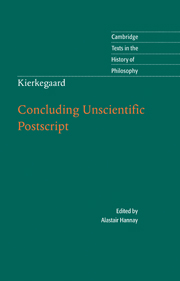Book contents
- Frontmatter
- Contents
- Introduction
- Chronology
- Further reading
- Note on the translation
- CONCLUDING UNSCIENTIFIC POSTSCRIPT TO THE PHILOSOPHICAL CRUMBS
- Preface
- Contents
- Introduction
- Part One The objective problem of Christianity's truth
- Part Two The subjective problem. The subject's relation to the truth of Christianity, or what it is to become a Christian
- 5 Conclusion
- Appendix: Understanding with the reader
- A first and last declaration by S. Kierkegaard
- Index
- Cambridge Texts in the History of Philosophy
A first and last declaration by S. Kierkegaard
Published online by Cambridge University Press: 26 February 2010
- Frontmatter
- Contents
- Introduction
- Chronology
- Further reading
- Note on the translation
- CONCLUDING UNSCIENTIFIC POSTSCRIPT TO THE PHILOSOPHICAL CRUMBS
- Preface
- Contents
- Introduction
- Part One The objective problem of Christianity's truth
- Part Two The subjective problem. The subject's relation to the truth of Christianity, or what it is to become a Christian
- 5 Conclusion
- Appendix: Understanding with the reader
- A first and last declaration by S. Kierkegaard
- Index
- Cambridge Texts in the History of Philosophy
Summary
As a matter of form, and for the sake of order, I hereby acknowledge, what it can hardly be of real interest to anyone to know, that I am, as people say, the author of Either/Or (Victor Eremita), Copenhagen, February 1843; Fear and Trembling (Johannes de silentio) 1843; Repetition (Constantin Constantius) 1843; The Concept of Anxiety (Vigilius Haufniensis) 1844; Prefaces (Nicolaus Notabene) 1844; Philosophical Crumbs (Johannes Climacus) 1844; Stages on Life's Way (Hilarius Bogbinder: William Afham, the Assessor, Frater Taciturnus) 1845; Concluding Postscript to the Philosophical Crumbs (Johannes Climacus) 1846; an article in Fædrelandet, No. 1168, 1843 (Victor Eremita); two articles in Fædrelandet, January 1846 (Frater Taciturnus).
My pseudonymity or polyonymity has had no accidental basis in my person (certainly not from fear of penalty under law, in respect of which I am unaware of having committed any offence, and, at the time of publication, the printer together with the censor qua public official have always been officially informed who the author was) but an essential basis in the production itself, which, for the sake of the lines and of the variety in the psychological distinctions in the individual characters, for poetic reasons required the lack of scruple in respect of good and evil, of broken hearts and high spirits, of despair and arrogance, of suffering and exultation, etc., the limits to which are set only ideally, in terms of psychological consistency, and which no factual person would, or can, dare to permit themselves within the bounds of moral conduct in actuality.
- Type
- Chapter
- Information
- Kierkegaard: Concluding Unscientific Postscript , pp. 527 - 531Publisher: Cambridge University PressPrint publication year: 2009

